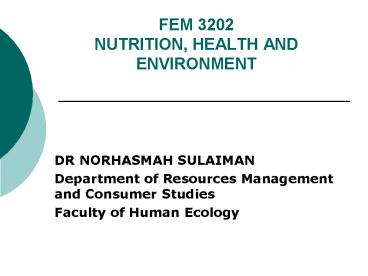FEM 3202 NUTRITION, HEALTH AND ENVIRONMENT - PowerPoint PPT Presentation
1 / 23
Title:
FEM 3202 NUTRITION, HEALTH AND ENVIRONMENT
Description:
FEM 3202 NUTRITION, HEALTH AND ENVIRONMENT DR NORHASMAH SULAIMAN Department of Resources Management and Consumer Studies Faculty of Human Ecology – PowerPoint PPT presentation
Number of Views:104
Avg rating:3.0/5.0
Title: FEM 3202 NUTRITION, HEALTH AND ENVIRONMENT
1
FEM 3202 NUTRITION, HEALTH AND ENVIRONMENT
- DR NORHASMAH SULAIMAN
- Department of Resources Management and Consumer
Studies - Faculty of Human Ecology
2
INTRODUCTION
- ? Food
- Is anything that can be used by the body to
sustain growth and bodily process and to provide
energy. Different food contain different
proportion of nutrients and calories - ? Basic function of nutrients
- Maintenance of life
- Growth
- Repair of tissue
- ?The plants and animals we consume.
3
FUNCTIONAL FOOD
- ? Food that contain physiologically active
compounds that provide health benefits beyond
their nutrient contribution.
4
NUTRIENTS
- Chemical substances obtained from food and used
in the body to provide energy, structured
materials, and regulating agent to support
growth, maintenance and repair of the bodys
tissues. - ? It is also can reduce the risks of some
diseases. - ? Six classes of nutrients
- ?carbohydrates, proteins, lipids, minerals,
vitamins, water.
5
NUTRITION
- ? The sciences of foods and nutrition and other
substances they contain, and of their actions
within the body - Ingestion
- Digestion
- Absorption
- Transportation
- Metabolism
- Excretion
- ? A broader perspective
- Economic, culture, psychological, consequences of
food and eating
6
CLASSIFICATION OF NUTRIENTS
- ? Chemical Composition of Nutrient
- Inorganic - not containing carbon
- Organic - containing carbon-carbon bonds or
carbon-hydrogen bonds - ? Essential Nutrients
- The nutrient that food must supply, needed
from outside the body (from food) - i. Macronutrients (Carbohydrate, protein, lipid,
water) - ii. Micronutrients (Mineral, vitamin)
- ? Non-nutrients
- components in foods that do not fit with six
classes of nutrients (i.e., alcohol, pigments,
additives)
7
ENERGY
- ?Defined as the ability to work.
- ? ATP (Adenosine triphosphate) is the form of
energy that the body uses to move and function - ? Unit of Energy calories or kilocalories
- One calorie as the amount of heat needed to
- raise 1 gram of water 1 degree Celsius.
- ? One kilocalories (kcalories/kcal) 1000
- calories
8
RECOMMENDED DIETARY ALLOWANCE (RDA)
- ? Defines as the average daily amount of a
nutrient considered adequate to meet the known
nutrient needs of practically all healthy people. - ? A goal for dietary intake by individuals.
9
FACTORS INFLUENCE FOOD CHOICES
- Flavor and Appearances of food
- Familiarity and culture background
- Emotions and social influences
- Desire to improve physical performance and
appearance - Food availability, cost and conveniences
- Environmental concerns
- Health concerns
10
WHAT IS HEALTH ?
- ? General Definition
- ? No disease and infirmity
- ? Not holistic
11
HEALTH
- WHO defines health as a state of complete
- physical, mental, and social well-being and
not merely the absence of disease or infirmity. - Physical health
- involves the condition of your body. This can
include exercise, nutrition, sleep, drug use, and
hygiene. Physical health can also include you
personal safety such as wearing a helmet when
biking or wearing a seatbelt in a car.
12
- ? Mental/emotional health
- Mental health deals with your ability to solve
problems (conflict management), self-esteem,
feelings and stress. - ? Social health
- This includes relationships and speaking
/listening skills. There might be times in which
you might disagree with your friends or
relatives this is normal in peoples lives.
However, you do not have to argue, or show
disrespect to other people.
13
WELLNESS
- Wellness
- A multidimensional, lifelong process that
includes physical, emotional, and spiritual
health. - An active process we work every day.
- Dimensions of wellness
- Physical health
- Spiritual health
- Emotional health
- Social health
- Occupational health
14
Wellness Dimensions
15
Determinants of Health
- Hereditary or Biological Factors
- Medical Care
- Life style
- Environment
16
ENVIRONMENTAL HEALTH
- Definition 1.
- Environmental health comprises those aspects
of human health, including quality of life, that
are determined by physical, chemical, biological,
social and psychosocial factors in the
environment. - It also refers to the theory and practice of
assessing, correcting, controlling and preventing
those factors in the environment that can
potentially affect adversely the health of
present and future generations.
17
ENVIRONMENTAL HEALTH
- ? Definition 2.
- Environmental health services are those services
which implement environmental health policies
through monitoring and control activities. - They also carry out that role by promoting the
improvement of environmental parameters and by
encouraging the use of environmentally friendly
and healthy technologies and behaviors. - They also have a leading role in developing and
suggesting new policy areas.
18
ENVIRONMENTAL SCIENCES
- Definition
- The branch of biology concerned with the
relations between organisms and their environment
19
ENVIRONMENTAL COMPONENTS
- ? Physical
- ? Biological
- ? Social
20
RELATIONSHIP BETWEEN ENVIRONMENT AND HUMAN HEALTH
- Man-------------------Environment
- (Host) --------------- (disease agent)
- ? Biological factors
- Physical factors
- Social factors
21
Host, Agent And Environment Relationships
- HOST
- AGENT DISEASE ENVIRONMENT
22
HOST
- Intrinsic factors
- Cannot be change
- Extrinsic factors
- Positive behavior
- Negative behavior
23
AGENTS
- Classifications
- Biological
- Chemical
- Physical
- Modes of transmission
- Vector
- Direct contact
- Others
- Means of entry
- Nose or mouth
- Food or water
- Skin lesion
24
THANK YOU































